Chandrajyoti confidently launches into her version of Johnny Johnny yes papa… The 11-year-old is a class five student in Shaskiya Prathmikshala, a government primary school in Dhanras village in Kota block in Bilaspur, Chhattisgarh.
“It was mazedar to learn this,” Chandrajyoti told Gaon Connection. And why wouldn’t it be when she had met ‘Johnny’ on a Smart TV at school. The TV was the idea of her teacher Deepti Dixit.
This isn’t the first time Dixit has taken an initiative to provide her students learning in innovative ways. Dixit had previously taught at a government primary school of Khargaini, in the same block, 25 kms from her home in Dhanras village.
On September 19 this year, she transferred to this school, closer home, to cater to her two-year old.

Teaching is her calling, said Dixit who has taught for about 13 years now.
In the past three months, she has introduced a programme to teach the children in middle school needlework (the middle school is in the same campus as the primary school), set up a muskaan pustakalay (library), a toy corner, and an LED TV that is used extensively to teach the children poems, letters of the alphabet, mathematics and science. The school is made up primarily of children from the tribal and Other Backward Caste (OBC) communities. All this through samudayik sehbhagita [community cooperation].
Also Read: From rag picking to reading — a retd school teacher in Jammu is transforming young lives
Putting social media to good use, the 36-year-old teacher contacted people who could help her with involving the community in the school.
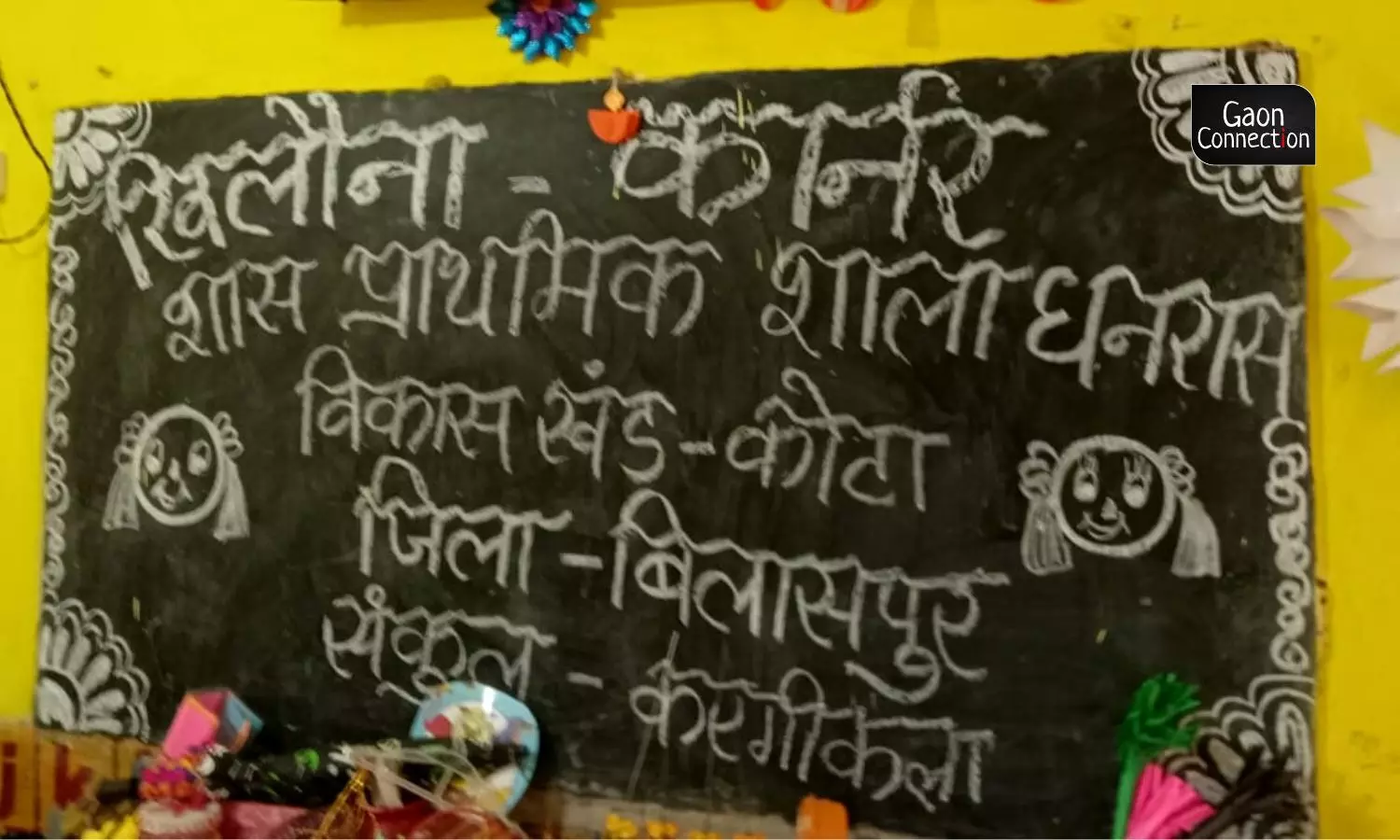
Dixit has set up a muskaan pustakalay (library), a toy corner, and an LED TV that is used extensively to teach the children poems, letters of the alphabet, mathematics and science.
Dixit is now single handedly responsible for 90 children, in classes 1 to 5 of Shaskiya Prathmikshala in Dhanras village. She said she had to multitask, ensure she spent enough time with each class and try to keep the students engaged in learning. She does have help from the headmaster, Devbrat Mishra but due to him being a cluster head, managing almost 12-15 schools, his involvement can only be limited.
Also Read: A geologist turned his back on fame and returned home to set up a village school
Keeping children engaged in learning
Teaching is her calling, said Dixit who has taught for about 13 years now. “From the very beginning I wanted to give back to the community and do that with the help of the community to make it sustainable.”
Apart from the LED TV, which she regularly uses to teach the rural kids at school, Dixit has a black umbrella with alphabets and numericals on them that she uses as a teaching aid. Pointing at a figure on the umbrella she asks them to identify it. She wants to bring about ‘bagless education’, she said.
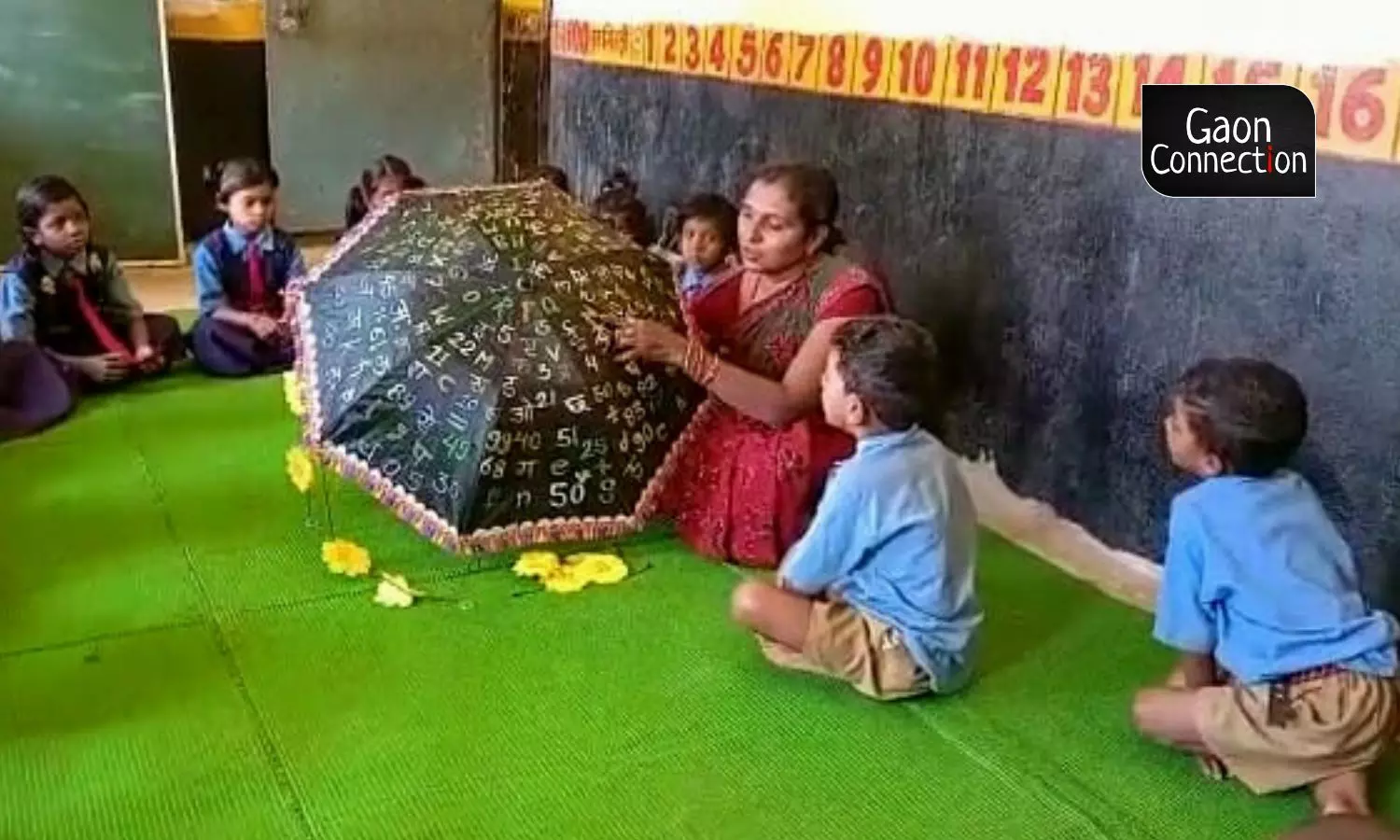
Dixit has a black umbrella with alphabets and numericals on them that she uses as a teaching aid.
“We have a basta viheen programme, where we depend on play methods for teaching. This keeps the children engaged and helps them understand their subjects in a reformative manner,” the primary teacher said. Her students come to school without bags on Saturdays when they learn just from play, poem recitation and so on.
Children of the school love her.
“I don’t like it when Deepti madam goes on leave. She makes us play so many games. My favourite is the chidiya [badminton] game,” Khushi said. The parents are happy too.
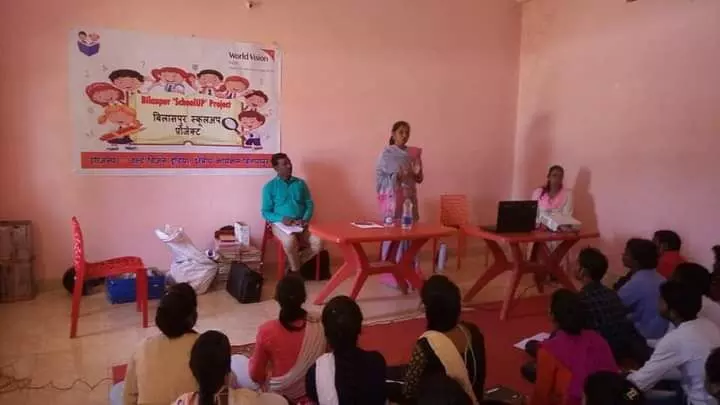
Sri Aurobindo Society, New Delhi, gave an award — Shiksha me Shoonya Nivesh Navachar — to Deepti Dixit for her community cooperation initiatives in the field of education, in 2018.
Dixit realised over time that there are a lot of people ready to help her turn her school into what she aspires it will be. “When I stepped out to ask for contributions, I realised people are ready to help if one is able to pitch them an idea well. My motive was to have a continuous small contribution rather than a one-time big amount,” she explained.
Her first donation was received from a friend who contributed Rs 1,000. Her father-in-law, a retired teacher, is a source of great support to her, she said.
Bringing mothers of her students into the fold
Dixit looked for women clusters in Dhanras.
“I met them at the panchayat office when they came there to collect their rations, and asked them if they would like to be trained in tailoring. It was easy because these are the women of my own village,” she explained.
The idea was to provide the women silayi prasikshan (training in sewing) at the school, and keep them abreast of what was happening with their children in school. The women who attended the four-month free course, with two hours of training everyday, between 2 pm and 4 pm, were encouraged to discuss their children’s performance and how they could be helped to improve.
Ram Chand Virwani, a 71-year-old retired director from the Rajya Sabha, Parliament House of India, based in New Delhi, provided four sewing machines to the school, the monthly salary of the trainer who would teach them sewing and tailoring.
“I wanted to do something for the women of the society but most entrepreneurship-related ideas like making pickles, papad etc needed marketing. To overcome that challenge, I thought of stitching training which can help rural women to earn their livelihood,” he said.
Virwani has also recently volunteered to pay for a computer-trainer for Deepti’s school. The plan is underway.
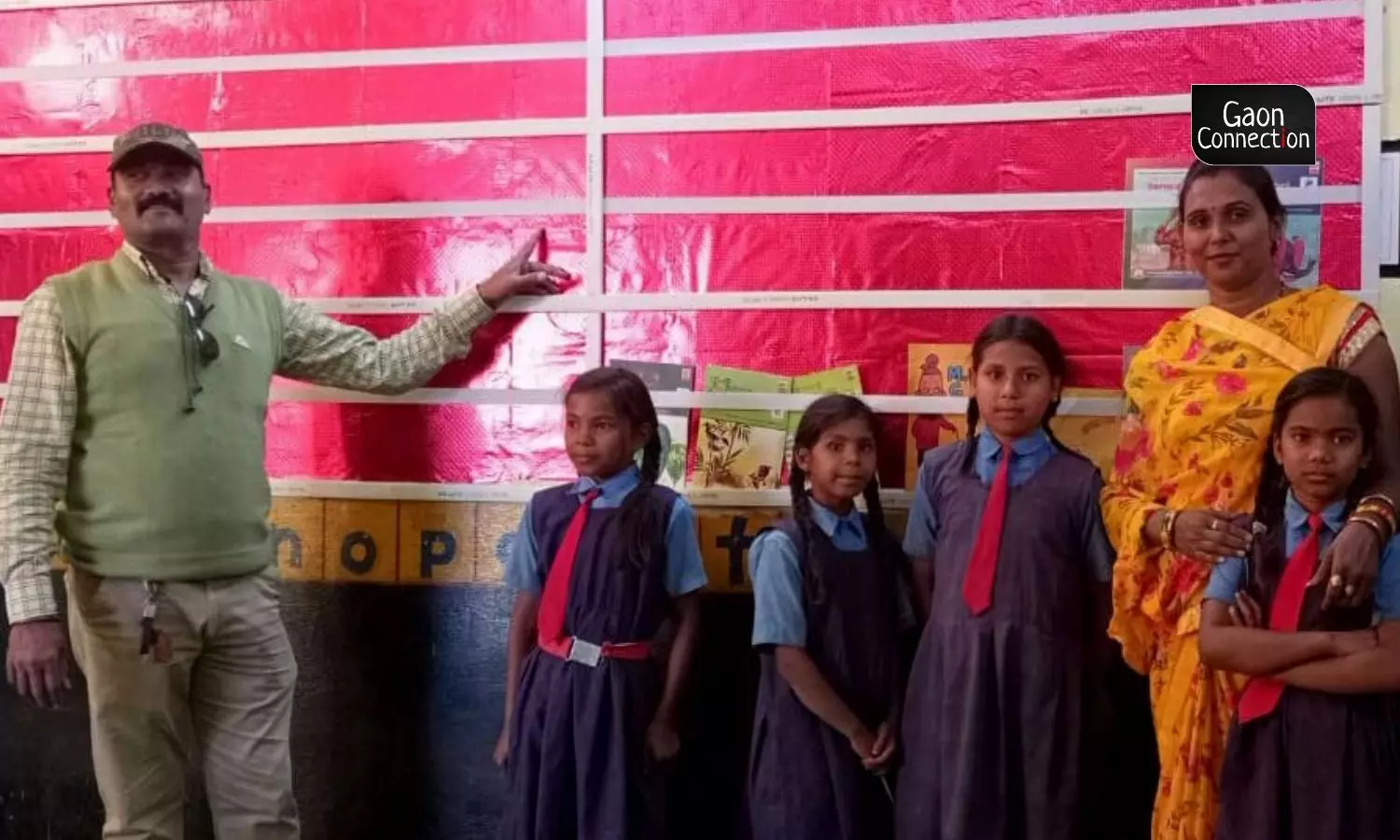
Children of the school love her, nagging over her taking even a single day leave.
Sonakshi Yadav, a resident of Dhanras who already knew tailoring was roped in to be the trainer. She now earns Rs 3,000 a month through her tailoring business and an additional Rs 2,000 per month by teaching 20 other women tailoring. These women are expected to start their own tailoring business.
Also Read: A farewell to alms as little hands that once begged now hold notebooks to read and write
“I made extra money after I joined and I love coming here to engage with the other women, and keep in touch with how my two sons are performing at school,” Yadav told Gaon Connection. The extra money she makes she uses to improve the lives of her two sons, Ayush and Piyush who study in class three and five respectively.
“I told Deepti madam that I can teach silayi. And now, I dedicate two hours doing that,” she added.
Sri Aurobindo Society, New Delhi, gave an award — Shiksha me Shoonya Nivesh Navachar — to Deepti Dixit for her community cooperation initiatives in the field of education, in 2018. She has also been recognised for her work at panchayat, district, national, and international level. She has bagged the CM Shiksha Gaurav Alankaran Award in 2022. She was one among the ten chosen teachers nationwide, under ChalkLit App, an online teacher’s training platform, for their exemplary work.
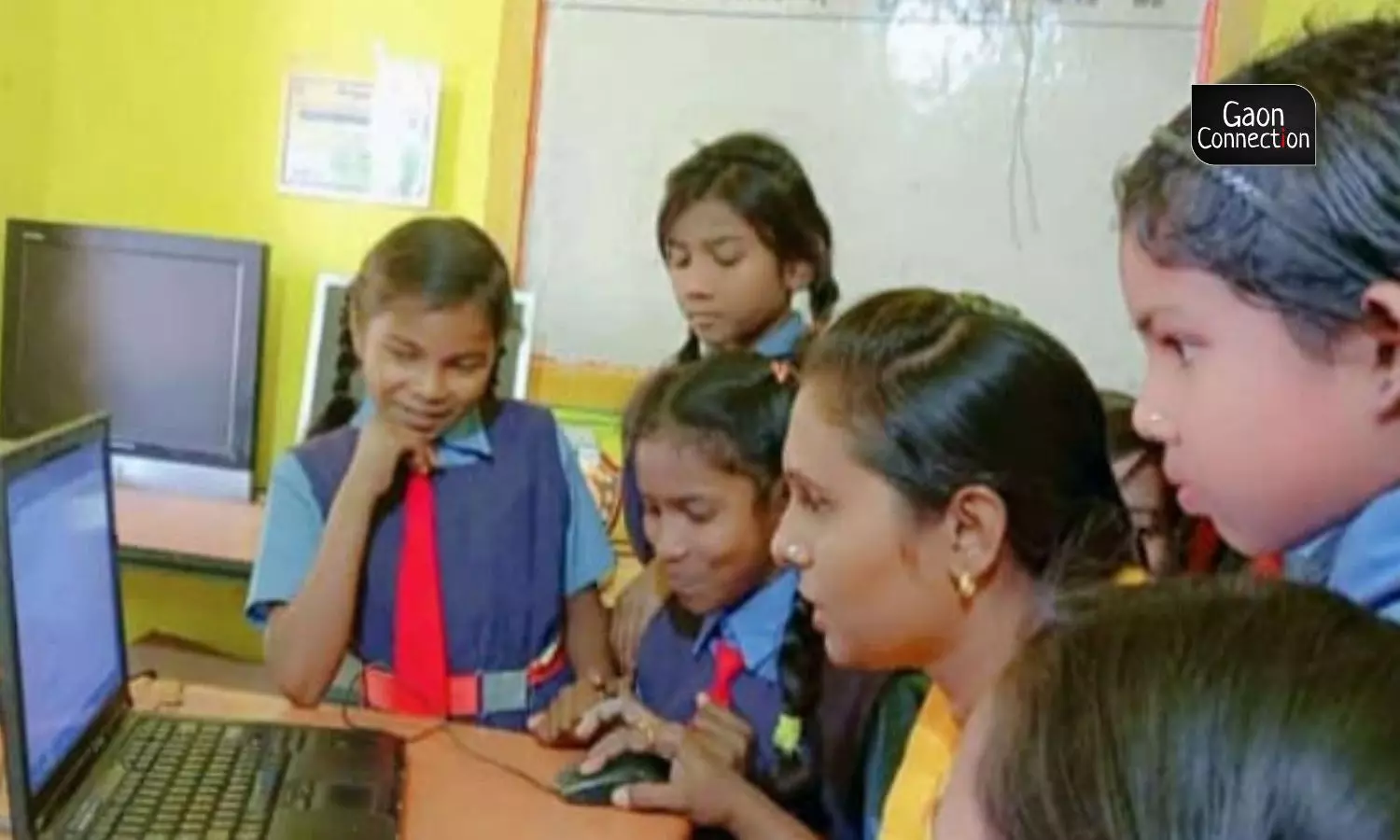
RC Virwani has recently volunteered to pay for a computer-trainer for Deepti’s school. The plan is underway.
Dixit’s line of working fits well with the National Education Policy, 2020 which emphasises on the development of the creative potential of each individual through vocational training, in addition to the book-related education. Bagless programme, which Dixit is implementing at her school, is a part of the national education policy.
Dixit had included the community in her plans and aspirations and that has helped move forward.
“My aspiration is to include as many people as possible to join this journey. And, I want my school to have the amenities of a private school. The government doesn’t have enough funds to facilitate a lot of co-curricular activities, but the community is helpful,” she said.
Often, there are elders in the community, who are invited to speak to the children and narrate stories to them. It could be anyone, but the end is the same, to expose the children to a wide array of experiences and interaction, the primary teacher concluded.


















